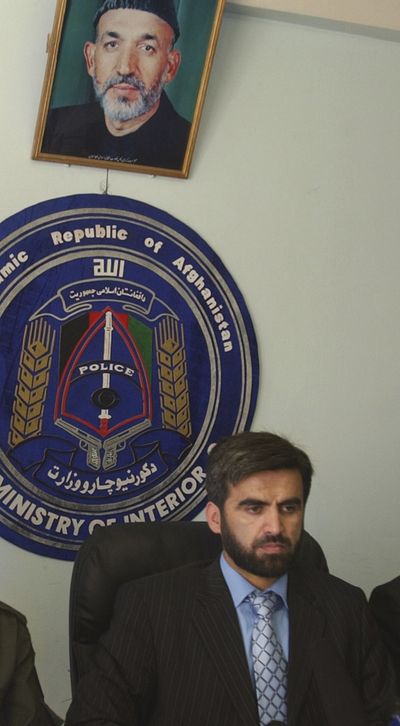Anti-Taliban leader killed
Afghan commanded Northern Alliance

KABUL, Afghanistan – A suicide bomber claimed the life of one of Afghanistan’s most renowned anti-Taliban commanders Saturday in a brazen strike that also killed a provincial police chief and two NATO soldiers and narrowly missed killing the German general who commands NATO troops in northern Afghanistan.
The explosion, which also wounded the governor of Takhar province, took place about 4 p.m. as the men were leaving what the governor’s spokesman described as a high-level security meeting in the governor’s compound.
Afghan Gen. Daud Daud, who commanded the U.S.-allied Northern Alliance forces in the last major battle against the Taliban regime after the Sept. 11, 2001, terrorist attacks in New York and Washington, died instantly in the explosion, the most prominent Afghan official killed so far since the Taliban launched its spring offensive.
For the last eight months, Daud had been the top police commander in northern Afghanistan and previously had been the country’s assistant interior minister in charge of anti-narcotics efforts. He was a key Northern Alliance commander during the group’s campaign against the Soviet occupation in the 1980s and was a close ally and bodyguard of anti-Taliban commander Ahmad Shah Massoud, who was killed in Takhar province in a suicide attack just two days before Sept. 11.
Also killed in Saturday’s attack was Sha Jahan Noori Takhar, the police chief in Takhar province, which is generally considered one of the most peaceful provinces in Afghanistan.
The International Security Assistance Force, as the U.S.-led coalition is known, declined to identify the NATO dead by either name or nationality. But a statement from President Hamid Karzai denouncing the attack offered condolences to German Chancellor Angela Merkel, indicating that the dead were German.
An ISAF spokesman confirmed that the 10 wounded included German Gen. Markus Kneip, the commander of NATO forces in northern Afghanistan. The extent of Kneip’s injuries was not known.
Faiz Mohammed Tawhidi, the provincial governor’s spokesman, said the governor, Abdul Jabar Taqwa, suffered injuries to his hands but was otherwise “OK.”
It was unclear which of the men the bomber was targeting – any of them would have been a valuable target – or how he managed to gain access to the governor’s compound.
Tawhidi said the bomber detonated his explosives as the officials exited the hall where they’d been meeting.
The bomber, Tawhidi said, may have been wearing a police uniform, something that if true would be another in a worrying trend of suicide attacks by members of the security forces or posing as them.
Dr. Mohammad Hassan Baseej, the provincial health director, confirmed that four people had been killed in the explosion and 10 wounded.
Takhar is known as a peaceful province in northeast Afghanistan that lies along the border with Tajikistan. Recently, however, it has been the scene of rising insurgent violence.
On May 19, a dozen protesters were killed in the provincial capital, Taloqan, during a demonstration to protest the killing earlier in the day by ISAF forces of four people, including two women, that Afghan officials said were civilians. ISAF said the four people killed in the raid were members of an Uzbekistan terrorist group that often fights with the Taliban. The demonstrators were shot when German troops opened fire after protesters tried to storm the local Provincial Reconstruction Team offices where ISAF advisers organize assistance to local authorities.
Last October Mohammad Omer, the governor of the neighboring province of Kunduz, was killed inside a mosque during a Friday prayer.
Violence has increased across the country as ISAF prepares for the July handover of security responsibilities in some parts of the country to Afghan forces.